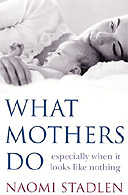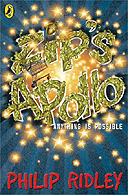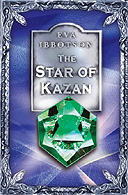I can remember the precise moment when I threw away the babycare manuals. My first-born was four-and-a-half months old and, according to Penelope Leach's Your Baby and Child, by now probably on four feeds a day. In reality, she was down to around 29. I then understood why they were called mother-and-baby books: they are mother, and you become baby. Virtually all of them infantilise mothers. Anyway, from that point on, my baby wrote her own manual. (To be fair to Leach - well, someone has to - she did also say listen to your child.)
But now something miraculous has happened. The best book on parenting you have never heard of has been published. It took six years to find a publisher and, when it eventually came out last year, was greeted in the national media by a resounding silence.
I think I know why Naomi Stadlen's What Mothers Do - Especially When it Looks Like Nothing didn't get double-page tabloid spreads or prominent placement by the Tesco checkout. Stadlen doesn't offer the definitive recipe to getting a six-month-old to sleep through the night, or a nannyish regime for taming troublesome tots. In fact, she sees the growth of such books as itself problematic - and not just because most of them, in one way or another, are confidence-undermining.
No, the how-to books, Stadlen suggests, reduce mothering to a series of tasks rather than a developing relationship. They encourage mothers to attend more to rules than to their babies. It's hardly surprising, then, that women who follow them complain that motherhood is boring, because they are missing out on the exciting bit - getting to know their own particular baby. Certainly, I mother worst when I make decisions based on the murmured precepts of some invisible third party rather than instinct and the needs of my children, myself and partner.
In this gentle but revolutionary book, Stadlen goes further and argues that feeling disoriented, confused and uncertain is exactly the right state of mind needed by a new mother or the teach-yourself process that lies ahead. If a woman considered herself an expert, or had set beliefs, she would find it hard to adapt to her individual baby.
Stadlen is a psychotherapist but (you shouldn't still need to write "a psychotherapist but" in a national newspaper in 2005, yet you do) also fabulously experienced at listening to mothers through the weekly discussion group, Mothers Talking, that she has run at the Active Birth Centre in London for the past 12 years. In her book she tries to create a language to describe the nameless feats of caring that most mothers (and other caretakers of small children) do every day.
Is this necessary? Should mothers join the legion of self-promoters? Must selflessness hire Max Clifford? A part of me, I'll admit, doesn't want mothering to need a job description, yet Stadlen is absolutely right to argue that mothers often feel lonely, invisible and unimportant, as evidenced by the number who say, "I get nothing done all day," when in fact they have been interacting all-consumingly with a newborn. Practical tasks we can describe, but not the act of a woman who has just started something - lunch, tidying up, a shower - when her baby wakes up and calls for her. Becoming instantly interruptible, she must put aside the threads of her personal existence and attend to it.
So little has been written about learning to comfort a baby, remarks Stadlen: compared with a mother who trains her baby, one who comforts seems to be "doing nothing". I wept when I read her exquisitely sensitive descriptions of it. "People ask mothers: 'Is he sleeping through the night yet?' 'Have you started him on solids yet?' 'Has he got any teeth?' No one seems to ask: 'Have you discovered what comforts him?' Yet the ability to sleep through the night, or to digest solid food or to grow teeth, has little to do with mothering. Babies reach those milestones when they are mature enough, whereas being able to comfort depends on a mother's ability."
But if we lack the words to describe what mothers do right, we have developed an extensive language to describe what mothers do wrong - a misappropriated Freudian vocabulary ("neurotic", "paranoid" or "a worrier") often used self-deprecatingly by mothers themselves. Stadlen wants a much more appreciative word "to honour intelligent motherly concern", and the vivid quotes from mothers help her supply it. Other mothers confess, on Amazon and Stadlen's own website, that this book made them weep too, certain that it will become a classic.
Here I come clean: I have a tiny personal connection to the author. Fifteen years ago, when I was struggling with breastfeeding, a friend (thank you, Sarah) suggested I call the helpline of the La Leche League, the group giving information and support to women who want to breastfeed. It was Stadlen who answered and the advice she gave me then enabled me to breastfeed first one and later a second child for longer than it would be decent to mention on these pages. (In the absence of publicity, her book is being passed from mother to mother like contraband - that's how I came to hear of it.)
Yet Stadlen isn't in the advice business. On the contrary, she suggests that the joint enemy of all mothers - be they full-time, in paid work, breastfeeding or bottle-feeding - is "anyone who claims that there is only one right way to bring up a child". So anxious is she that her descriptions should not become prescriptions that she invites readers to write to her if they detect her trespassing into giving "rules".
What I love most about her book is that, although it is so warm and affirming that it made me feel that I wasn't as lousy a mother as I often believe, it doesn't sentimentalise motherhood either. Stadlen is not Polyanna or Pangloss. She is brilliantly insightful, for instance, on why mothers can become defensive and competitive, or how those with high expectations of themselves can also demand more of their babies than they can deliver. She also appreciates how difficult a baby's utter dependency can feel to women who have prized independence in their professional lives, and how - in a culture in thrall to busyness - what an enormous change is required to refrain from busying oneself with a long list of tasks in order to match the baby's pace.
Personally, I think she is a bit hard on the ideas about maternal ambivalence expressed by the psychoanalyst Donald Winnicott and the new breed of motherhood authors including Kate Figes and Rachel Cusk. Winnicott's 1958 paper, with its playful list of 18 reasons why a mother hates her baby ("I suggest that the mother hates the baby before the baby hates the mother"), reassured me when I was at my most unloving, and provided an important early breach in the wall of idealisation surrounding motherhood. But Stadlen thinks Winnicott helped introduce the idea that maternal ha tred is the norm, and perhaps even beneficial to mothers and children.
She is even sterner with Figes et al. For these writer-mothers, Stadlen suggests, moments of hate arise primarily when their baby won't fall asleep at those times that their mother is desperate to get on with their book, poem, or article. Just when it seems, disappointingly, that Stadlen is about to join the backlash club, excoriating these women for being too self-centred to mother properly, she comes in with a much tenderer explanation - that they find the degree of closeness with their babies unbearable because they don't feel sufficiently separate from them. They suffer from what Mel Brooks in The Producers calls "the urge to merge", and Stadlen is superb on how such mothers can feel accused by their babies' crying because they don't have a steady sense of themselves.
This is an author who believes that "rarely is it necessary to tell a mother what to do. It may demoralise her further, and certainly does not help her to learn". Her profoundly moving account of how, slowly and with difficulty, mothers can come to trust their children and themselves, should be given (instead of those free packs of horribly scented wipes that make all babies smell the same) to every new mother - and quite a few old ones too.
· What Mothers Do - Especially When it Looks Like Nothing, by Naomi Stadlen, is published by Piatkus Books at ?9.99. To order a copy for ?9.99 with free UK p&p, call the Guardian Book Service on 0870 836 0875 or go to www.theguardian.com/bookshop.



